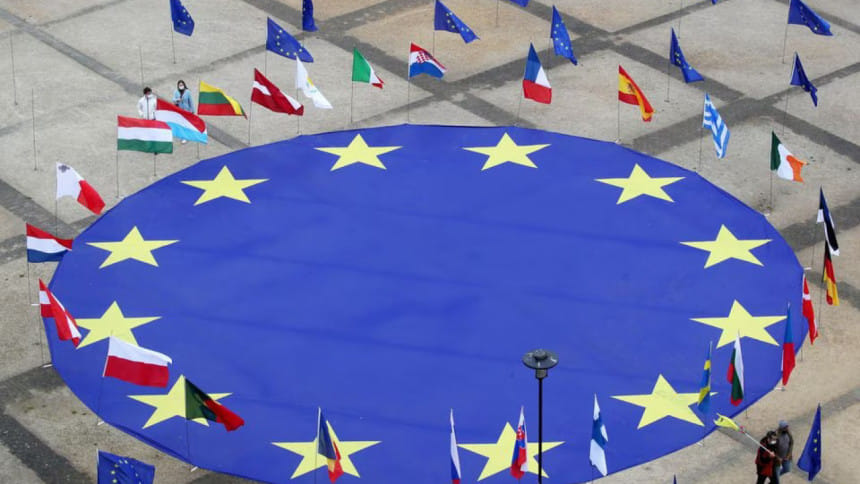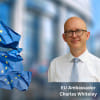Building Europe as a strong global partner

Every May 9, Europe Day is celebrated around the world. With 27 member states and 450 million EU citizens, Europe Day is a moment to reflect on how far the bloc has advanced both its own internal integration and its collective engagement with the wider world.
The EU is in essence a peace project. It was born in the aftermath of the Second World War and was designed from its inception to make a repeat of that disaster not only unthinkable, but also impossible.
The genesis of today's EU was the Schuman Declaration, presented by French Foreign Minister Robert Schuman on May 9, 1950. It proposed the creation of a European Coal and Steel Community, whose members would pool coal and steel production – the drivers of war.
In the ensuing decades, the six-member European Coal and Steel Community morphed into the European Economic Community, succeeded by the European Community and finally by today's European Union in 1993.
The construction of the European project has witnessed the progressive expansion of membership. Any European state is eligible to join the EU and must fulfil a range of political and economic conditions to become a member. There are now eight "candidate" countries engaged in the accession process, with Ukraine joining that group in June 2022.
The progressive integration of EU member states has many facets: from the launch of the EU Single Market with free movement of goods, services, people and capital in January 1993 and the advent of the euro in 1999, to the expansion of collaboration on security and defence issues and the creation of a European diplomatic service.
Isolationism and protectionism have never been a part of the EU's agenda. The EU recognises its responsibilities to the wider world, exemplified by the fact that it is the largest global provider of development and humanitarian assistance. In the space of 20 years, the EU has deployed 37 civilian-military missions overseas, with a diverse range of tasks, including support to the Palestinian police force to rescuing migrants in the Mediterranean Sea. Over 140 EU representations abroad – including the EU Delegation here in Bangladesh – pursue trade, political, development, and humanitarian ties with host countries.
The EU has trade agreements with over 70 countries and has the most generous trade regime in the world, including duty-free and quota-free access to its market for all Least Developed Countries (LDCs). The EU is committed to working with Bangladesh to ensure a smooth transition to GSP+, which entails the implementation of 32 international conventions on environmental, social and human rights concerns in order to retain optimal access to the EU market.
The EU is using its political and economic weight to shape its response to global challenges.
The existential threat posed by climate change has galvanised EU action. The European Climate Law writes into law the goal set out in the European Green Deal for Europe's economy and society to become climate-neutral by 2050. The law also sets the intermediate target of reducing net greenhouse gas emissions by at least 55 percent by 2030, compared to the 1990 levels. As the largest provider of climate finance – 23 billion euros in 2021 – the EU recognises its responsibilities to countries that need international support in tackling the consequences of climate change.
A major new worldwide EU initiative – Global Gateway – has been launched to provide, in the words of European Commission President Ursula von der Leyen, "a new strategic approach to investment." Global Gateway is mobilising billions in values-driven support to infrastructure around the world. Here in Bangladesh, substantial funding is in the pipeline to assist the development of renewable energy.
The EU is a bloc that is rooted in the shared values of human rights and democracy. The European Court of Justice and the EU Fundamental Rights Agency help to ensure that the rights of EU citizens are protected by their national governments. All the EU's bilateral agreements with partner countries include a joint commitment to these values. The EU also supports human rights actors around the world, including civil society.
The spectre of war on the European continent is now a reality again in the form of the Russian aggression in Ukraine that has killed thousands and displaced millions. This is a threat not only to peace in Europe but also to world peace and prosperity. It is also a violation of the UN Charter and Ukraine's territorial integrity. As a direct neighbour of Ukraine, the EU and its member states are supporting the Ukrainian people in this darkest hour.
As we mark Europe Day here in Dhaka – as well as the half-century anniversary of Bangladesh-EU relations – it is a moment to reflect on the progress that the European Union has made in the 73 years since the Schuman Declaration, as well as the challenges that undoubtedly remain.
HE Charles Whiteley is ambassador/head of delegation of the European Union to Bangladesh.

 For all latest news, follow The Daily Star's Google News channel.
For all latest news, follow The Daily Star's Google News channel. 








Comments